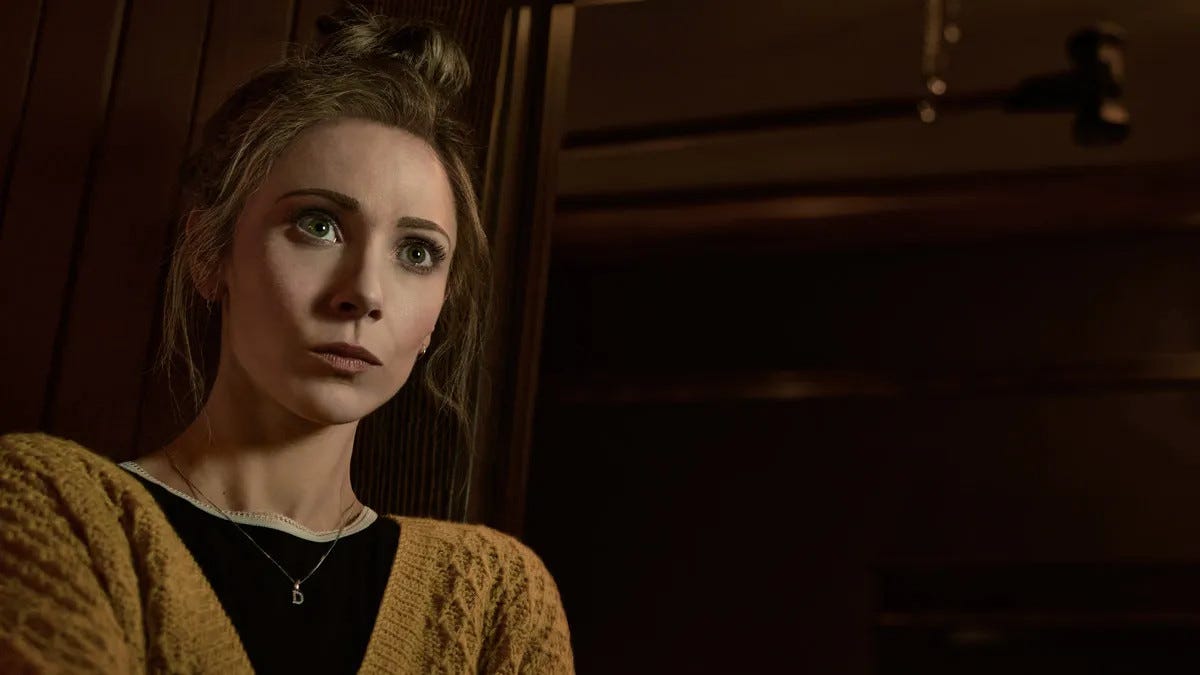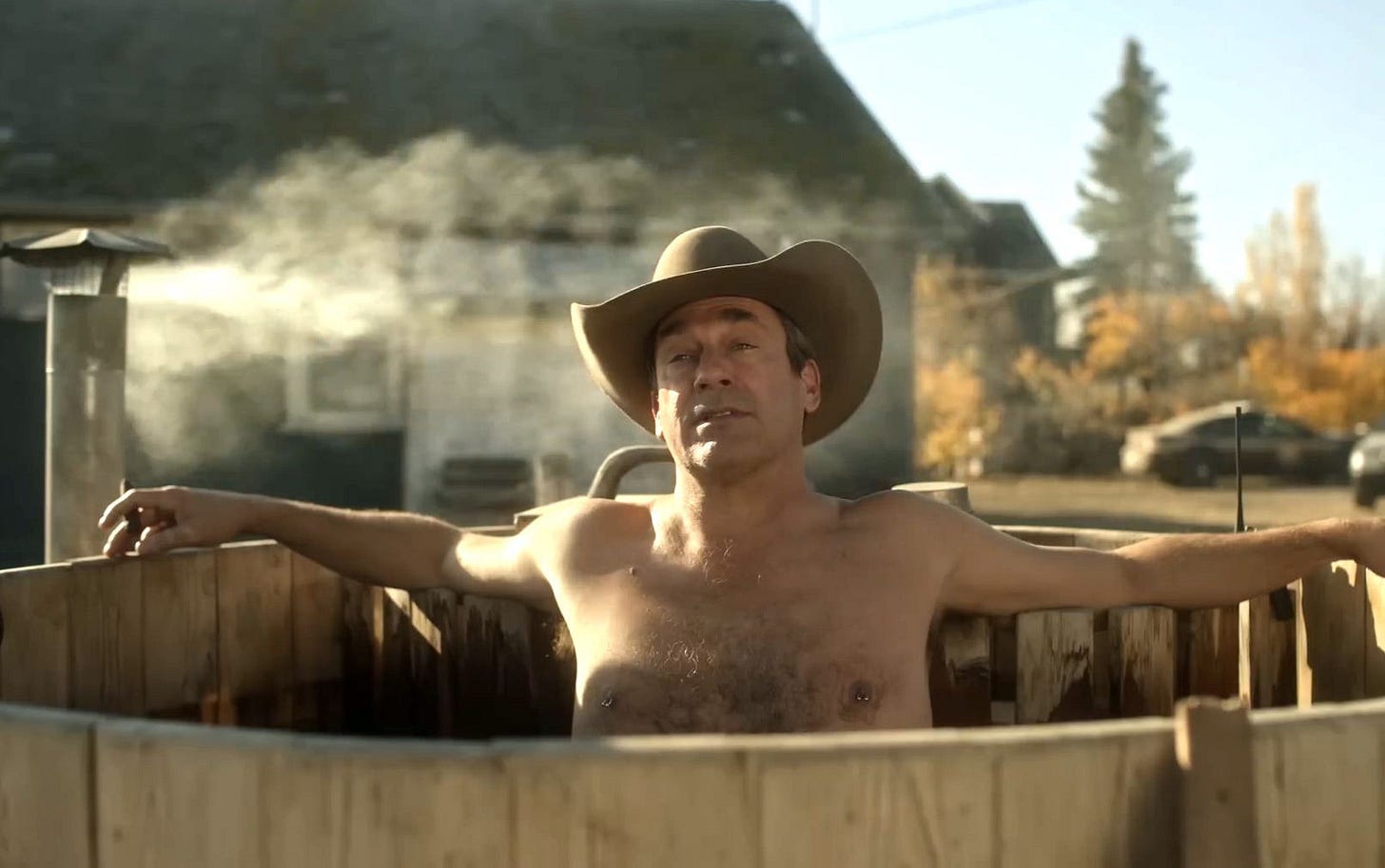‘Fargo’: Reversing the Polarity of the Antagonist
The Fifth Season of Noah Hawley’s Fargo isn’t perfect, but it showcases a neat trick.
NEW STANDARD DISCLAIMER: This newsletter aggressively spoils things.
Noah Hawley’s Fargo series, which is a deliriously loose adaptation of the Coen Brothers 1996 classic film of the same name (kind of simultaneously a homage and a sort of expanded universe), is in its improbable fifth season as I write this. Improbable because the show hasn’t exactly dominated pop culture much, and also because three of its initial four seasons were kind of muddled messes1. The show has always delivered some great moments and taken some real storytelling risks, but aside from the first season it hasn’t really gelled. So this fifth entry was unexpected2.
It’s fine3. It’s not exactly brilliant, but if you’re craving that delicious mix of Midwestern Nice, incredibly stupid criminals, and the slow grinding of banality4 the original film basically trademarked, this will be great fun for you. Plus, it’s loaded with acting talent: Jennifer Jason Leigh chewing scenery with what can only be called gusto, Jon Hamm somehow making a middle-aged paunch look good5, and Juno Temple exemplifying the standard Hollywood 105-pound hellion who will absolutely murder you, no problem6. Temple plays Dorothy-slash-Nadine, a woman who fled the violently religious Sheriff Roy Tillman (Hamm) years ago, made a new identity, and married into the wealthy Lyon family. The Lyon matriarch, Lorraine (Leigh), is a nasty piece of work, too, and her ambivalence and suspicion of her daughter-in-law are fully paid off when Dot’s past comes back to haunt her7.
It’s fun, and worth watching. But what’s really interesting is how skillfully Hawley manipulates the viewer with regard to the antagonist of the show. Because who, exactly, is the antagonist is a shifty, slippery exercise that largely depends on who is on screen at any moment8.
There’s Only One Person on Earth Who Gets that Deal: A Baby
We typically expect the protagonist/antagonist dynamic to be pretty binary—we’ll take one of each, please. But Hawley works up two really unlikable folks to root against in this season. First you have Hamm’s Tillman, a “constitutional sheriff” who believes the only authority that sits above his is god’s9. He’s the sort who will lecture a young husband on the acceptable reasons to beat your wife, and also the sort who will spend years searching for a wife who fled from him in the middle of the night because he considers her to be his property. He’s awful! But also portrayed by a man with supernatural charisma10, so it works.
Leigh’s Lorraine Lyon isn’t much better. She’s the sort who believes she is wealthy because she’s better than anyone else11, and she seeks to control every situation in her life with ruthless applications of money and force12. She’s prone to condescending speeches to people about their relative importance compared to her, and Leigh delivers every single line soaked with a corrosive sort of disdain that’s kind of thrilling.
So, it’s easy to hate both Lorraine and Roy. And then Hawley plays a trick and puts them in a scene together13.
This is a great writing move, because it’s disruptive. Both Roy and Lorraine are set up as antagonists, even villains. You hate them, because they are terrible, and because they oppose Dorothy, our spunky protagonist and also a sympathetic figure. While the two characters are separated this is fine: We all find it very easy to dislike multiple people simultaneously14. But then Roy shows up at the Lyon house seeking to assert his husbandly rights over Dorothy, and suddenly everything ... shifts. Because Lorraine naturally disdains Roy as much as she disdains everyone and everything else, and because Roy seeks to force her to do something—turn over Dorothy, a woman she hates and who she has had forcibly committed—she puts Roy in his place.
And suddenly becomes a good guy, because she’s now aligned with Dorothy’s interests. You find yourself rooting for her, a woman who mostly likely made your teeth rattle with hatred just a few minutes before. It’s the whole the-enemy-of-my-enemy effect in play: Lorraine is a monster, but when she squares off against Roy Tillman, she’s our monster.
For Thy Peace, I Pawn My Own Soul

Of course, Lorraine should be ecstatic to meet Roy. She should immediately do whatever she can to render Dorothy unto his biblical authority, because it both gets rid of a daughter-in-law she dislikes and suspects of skulduggery and punishes her, which is a very Lorraine thing to do. What’s great about this realignment of antagonistic energy is how obvious it is that Lorraine doesn’t embrace this solution solely because she instantly knows who Roy Tillman is, and hates him with a white hot intensity15. She enjoys insulting him and frustrating him the same way she enjoyed insulting and frustrating a pair of chauvinistic bankers at a lunch meeting earlier in the episode. So this little twist is also deeply rooted in character work.
The viewer now has a conundrum. We know we’re rooting for Dorothy, who clearly has good reasons for what she did, who truly seems to love her family. But who do we root against? You want Lorraine to squash the loathsome Roy like a bug. You want Roy to make Lorraine sweat a little for once, to unsettle her and knock that sarcastic little grin off her face. If Lorraine wins, that will just increase her power and ability to make Dorothy miserable. If Roy wins, Dorothy is in deep shit. You can hope that they destroy each other—and this is Fargo, so that is always a possibility, because this show loves a gray, equally brutal universe. But you have no good sides to pick there16.
More importantly, this setup allows Hawley to play around with who the Big Bad is, which keeps the energy of the show unpredictable. Every move Lorraine or Roy make could be matched, and depending on whether their actions help or harm Dorothy your opinion of who the true antagonist is might shift, then shift back. It’s a neat trick, and a lot of fun.
Of course, when I watch this show my mind always wanders to how cold and miserable everyone must be all the time. And then all the crimes start to make sense17.
NEXT WEEK: Skidibi Toilets and the Bare Metal of Narrative
If you enjoy this newsletter, consider subscribing to my paid fiction Substack, Writing Without Rules: From the Notebook!
This also describes me both professionally and personally.
Still no Half Life 3, but we get Fargo 5. The world is unfair.
As anyone who has ever been in a relationship with another human being knows, fine is the most loaded word of all time. It’s practically radioactive.
Is SLOW GRINDING BANALITY the title of my memoir? It certainly should be, based on my conversational skills.
I also make a middle-aged paunch look good, because as Mom always said, I am a special boy.
To be fair, this describes The Duchess pretty well, so these kind of murderous, tiny women are certainly drawn from reality.
My own past involves Dungeons & Dragons, baseball cards, and The Boy Scouts of America. Which is to say: Infinitely worse.
Much like the way the title of Worst Cat in Existence depends largely on which one of my five criminals is nearest the pile of vomit I just stepped in.
This is my attitude towards fashion. Only god can tell me I’m wrong.
If I met Jon Hamm in a random hotel somewhere, the evening would end with him owning my house and me sporting a new HAMM! tattoo on my ass.
The same way I believe I am not wealthy because I am better than anyone else. You plebes can keep your filthy lucre, thanks, I’ve got my dignity. Well, not dignity, per se, but … you know, forget it.
Same, except instead of money and force I use whiskey and self-deprecating humor. Sometimes strategic crying.
We writers really are the worst sort of people.
For example, I am currently disliking approximately 356 people and I’m not even breaking a sweat.
Tillman’s general unlikability is a testament to Hamm’s acting talent, as Hamm himself is a joy. I mean, I couldn’t act that well. People love me no matter what I do. It’s a problem.
Sort of like when you go to a party and the host has nothing but flavored hard seltzers to offer you as a beverage: No matter your choice, you have already lost.
I mean, all it takes is for lunch to be ten minutes late and I’m ready to commit murder.



